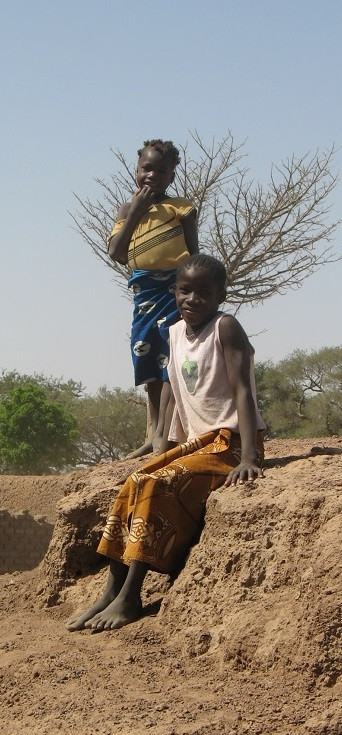Project Dype
Childhood and parenthood
The ANR DyPE project, funded by France’s Agence Nationale de la Recherche, ANR (December 1, 2012 - November 31, 2016).
DyPE was a section of the SLAM Project (ANR Project no. 12-BSH1-0005-01) centred on the problematics of childhood and parenthood.
The project studied the family environment of children in rural Africa, how that environment is changing and its impact on attitudes toward children.
It focused in particular on the dynamics resulting from the emergence of new models of socialization and their confrontation with existing models, and on their effects in term of both progress and social inequality.
There were three lines of research, each on a specific question.
1) How is children’s relational environment changing with the advancing demographic transition? Who do children grow up with, in whose care?
This question was examined from three angles: the kinship network, composed of the child’s relatives; the domestic group, defined as the set of persons sharing economic resources; and the dwelling or residential unit. There were two sections to this part: one was describing the family environment and changes in it according to the three criteria cited above; the other consisted in modelling kinship networks as a function of the demographic regime, a means of apprehending the effect of demographic constraints on family environment.
More information : Children’s family network
2) How do new behaviours toward children spread? Are they conditioned by the family framework? Are they leading to differential treatment of children and perhaps to new inequalities?
The influence of family environment on attitudes toward children was examined by attending to different practices: schooling, health-related practices (mortality, female genital mutilation), child mobility, and civil registration of births. SLAM data were particularly well adapted to handling this question: not only do they take into account the child’s different relational networks (kinship, residence, economic unit) but, because they are longitudinal, they also allow for examining behaviours and personal outcomes in connection with the initial family environment.
More information: Attitudes towards children
3) Public discourse, representations and experiences: How does parenthood get constructed given the increasingly diverse perspectives on children?
Here the emphasis was on normative frames and the subjective approach to personal experience. The question was considered from three angles:
- norms and representations of child and parent figures as transmitted by oral literature (tales, proverbs);
- representations and prescriptions diffused through public policy (from international programmes to intermediary structures: school, healthcare centres, and others);
- expectations about and experiences of parenthood (interviews with individual respondents).
More information : Expressions of Parenthood and Childhood
Data
The project drew on the corpus of SLAM statistical data, particularly a follow-up survey and a life course survey. It also used qualitative data, including a corpus of Bwa tales, individual interviews, and a corpus of legal and institutional texts.
More information: data
Research team
A multidisciplinary team
The project brought together fourteen researchers from a variety of disciplines, (demography, anthropology, sociology, history, communication science) and different institutions working on different sites: France, Mali, Burkina Faso and Belgium.
The team met by way of videoconference every 6 to 8 weeks and held a plenary session once a year.
Project participants
- Aurélien Dasré, démographe, enseignant-chercheur au Centre de recherches sociologiques et politiques de Paris à l’Université Paris Ouest Nanterre La Défense
- Alexis Dembele, journaliste et anthropologue, responsable du département « Communication et journalisme » de l’Université catholique d’Afrique de l’Ouest à Bamako
- Pierre Diarra, anthropologue et historien des religions
- Joseph Tanden Diarra, anthropologue et sociologue, recteur de Université catholique d’Afrique de l’Ouest
- Pascaline Feuillet, chargée d’étude à l’Institut National d’Études démographiques
- Joëlle Gaymu, démographe à l’Institut National d’Études Démographiques
- Véronique Hertrich, démographe à l’Institut National d’Études Démographiques
- Abednego Kamaté, interprète, chargé de la communication et de la coordination
- Cécile Leguy, ethnolinguiste, enseignante-chercheure au Laboratoire Langues et civilisations à tradition orale à l’Université Sorbonne Nouvelle Paris 3
- Marie Lesclingand, démographe, enseignante-chercheure à l’Unité de Recherches Migrations et Société à l’Université de Nice Sophia Antipolis
- Emma Lherm, chargée d’étude à l’Institut National d’Études démographiques
- Bruno Masquelier, démographe, enseignant-chercheur au Centre de Recherche en Démographie à l’Université Catholique de Louvain
- Sophie Pennec, démographe à l’Institut National d’Études démographiques
- Marc Pilon, démographe au Centre Population et Développement / Institut de Recherche pour le Développement
- Catherine Rollet, démographe et historienne, professeure émérite au Laboratoire Printemps à l’Université de Versailles Saint-Quentin-en-Yvelines
- Olivia Samuel, démographe, enseignante-chercheure au Laboratoire Printemps à l’Université de Versailles Saint-Quentin-en-Yvelines
Scientific leaders
Véronique Hertrich et Olivia Samuel
Contact
The complete ANR project
-
 Photo Slam, Ined
Photo Slam, Ined
To follow our project
With the issue Be-DyPE, you get focuses and news from our research results.
